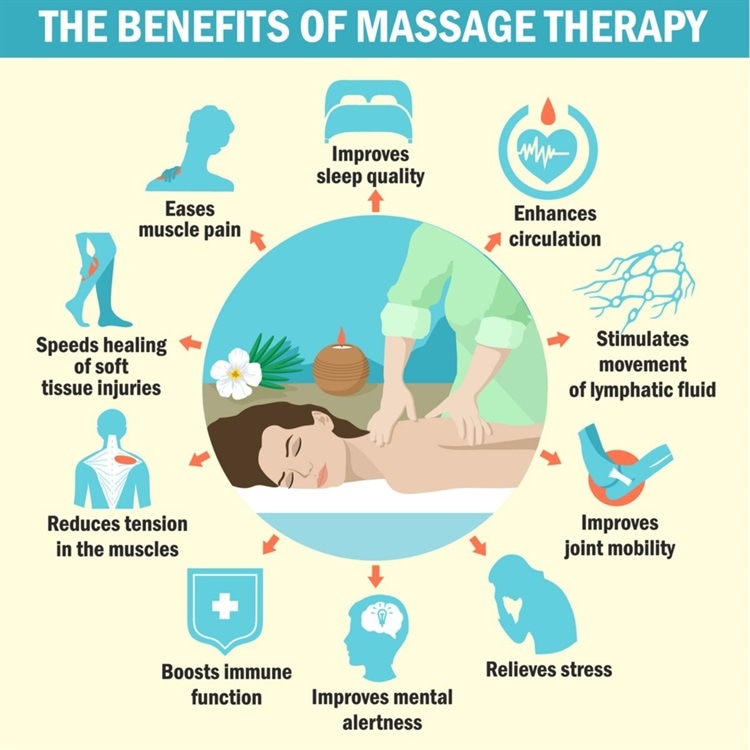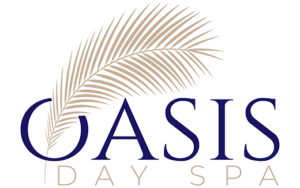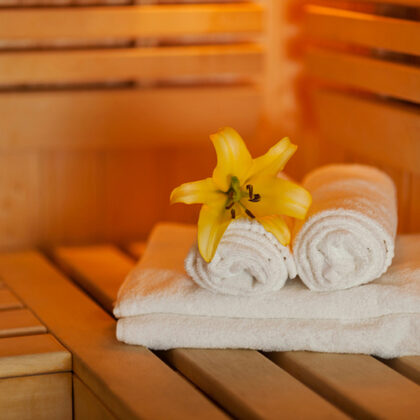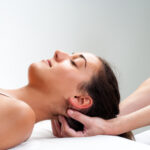The Health Benefits of Massage
Massage is one of the earliest known therapeutic practices. Treatments for various disorders were based on the belief that massage therapy had curative characteristics shared by many ancient cultures, including the Greeks, Egyptians, Chinese, and Indians.
It is the technique of kneading or manipulating a person’s muscles and other soft tissue to promote their health and well-being. As part of this manual treatment, the muscles, tendons, ligaments and tendons, and fascia are gripped, manipulated, and pressured.
A growing number of medical illnesses and circumstances are benefiting from massage in addition to regular therapy. This article will explore the health benefits of massage therapy.
Types of massage
Massage treatment offers various ways of delivering touch, pressure, and intensity. Swedish massage is a gentle technique using lengthy strokes, kneading, deep circular motions, vibration, and tapping. It has a calming and energizing effect.
Massage techniques that focus on the deepest levels of muscle and connective tissue are known as a deep massage. A popular usage for it is to treat muscular damage after an injury.
Unlike traditional Swedish massage, which treats everyone, sports massage targets athletes and their specific needs. Trigger point massage fixates tight areas of muscle fibers that can happen after an injury or from using your muscles too much.
Lymphatic fluid maintains bodily fluids and removes waste. Lymphatic massage employs gentle touch to improve lymphatic flow. Lymphatic massage is helpful for those with inflammation, especially those with arthritis and mastectomies.
Health benefits of massage therapy
Massage is often regarded as an element of integrative medicine. It is given alongside conventional therapy for many medical illnesses and circumstances.
Therapeutic massage increases muscle blood flow and warmth, boosts performance, reduces cell adhesion, increases muscular flexibility, and reduces injury risk.
For thousands of years, therapeutic massage has been practiced throughout the globe. Researchers from the UK presented a study in the British Journal of Sports Medicine, which shows that therapeutic massage accounts for roughly 45% of physiotherapy treatment time. Therapeutic massage is employed in broad ways, including competitive preparation, during contests, and post-competition recovery.
Therapeutic massage uses mechanical pressure to decrease tissue adhesion. Mobilizing and elongating decreased or adherent connective cells may increase muscle-tendon compliance.
Biomechanically, dynamic passive stiffness, strong active stiffness, and stationary joint end range of motion are used to determine muscle-tendon unit conformity.
Massage can reduce stress, increase relaxation, reduce pain and muscular soreness and tension, improve circulation, energy, and alertness, decrease blood pressure and heart rate, and enhance immunological function.
How is massage beneficial to the body?
Different physiological mechanisms are used in massage, which provides benefits to the body.
Shallow skin friction induces hyperemia by increasing regional warmth. Regional heating boosts blood flow. Massage increases skin and intramuscular warmth; however, this may not affect muscle blood circulation.
Stress and worry can be eased by the relaxation that comes with receiving a massage. One is the sympathetic nervous system, responsible for the “fight-or-flight” reaction in times of stress, and the other is the parasympathetic system, which is responsible for the regular and day-to-day activities leading to relaxation and rest.
Researchers published an article in The Journal of Clinical Psychiatry that suggests a massage can reduce anxiety by increasing parasympathetic response.
Stress hormone cortisol may be reduced by getting a massage, and the neurotransmitters serotonin and dopamine can be increased, which are known to help regulate your mood. For people who suffer from sleeplessness due to menopause or congestive heart failure, massage treatment can help.

Many researchers have investigated the possibility of massage relieving acute back, neck, headache, and knee pain.
A 60-minute massage given several times a week can be more effective than fewer or shorter massages in providing relief. However, the researchers caution that this benefit may be temporary rather than long-term.
According to the article published in the Journal of Alternative and Complementary Medicine, frequent massages can help the body produce more white blood cells that can fight against illnesses.
An article published in Gastroenterology Nursing reports that an abdominal massage may help constipation. Results showed that abdominal massage reduced symptoms of constipation, shortened time intervals between defecation, and improved quality of life in individuals diagnosed with postoperative constipation.
In their article published in PLOS ONE, researchers demonstrated that fibromyalgia’s effects on sleep, cognition, and mood improve after five weeks of massage therapy.
The toll on the body and mind of those battling cancer is enormous. Cancer pain relief, relaxation, and quality of life can be improved by massage therapy. According to research published in Integrative Cancer Therapies, cancer discomfort may be alleviated by the use of massage treatment.
People of all ages can benefit from massage treatment. It is more than just self-indulgence or self-pampering exercise. Whether someone has a particular health issue or is just searching for a way to de-stress, this is a strong tool to use.
References
- Cleveland Clinic (2021) Everything You Need to Know About Massage Therapy, Health Essentials. Available at: https://health.clevelandclinic.org/benefits-of-massage/ (Accessed: 4 July 2022).
- Colleen Ryan, Boonyong Keiwkarnka, M.I.K. (2003) ‘Traditional thai massage : unveiling the misconceptions and revealing the health benefits’, Journal of Public Health and Development, 1, pp. 69–75. Available at: https://www.semanticscholar.org/paper/Traditional-thai-massage-%3A-unveiling-the-and-the-Ryan-Keiwkarnka/e615c42a86b5e2ee4958fb524da747a383535560.
- Galloway, S.D.R. and Watt, J.M. (2004) ‘Massage provision by physiotherapists at major athletics events between 1987 and 1998’, British Journal of Sports Medicine, 38(2), pp. 235–236. doi.org/10.1136/bjsm.2002.003145.
- Gasibat, Q. and Suwehli, W. (2017) ‘Determining the Benefits of Massage Mechanisms: A Review of Literature’, Article in Journal of Rehabilitation Sciences, 2(3), pp. 58–67. doi.org/10.11648/j.rs.20170203.12.
- Li, Y.H. et al. (2014) ‘Massage therapy for fibromyalgia: A systematic review and meta-analysis of randomized controlled trials’, PLoS ONE, 9(2). doi.org/10.1371/journal.pone.0089304.
- Rapaport, M.H. et al. (2016) ‘Acute Swedish Massage Monotherapy Successfully Remediates Symptoms of Generalized Anxiety Disorder: A Proof-of-Concept, Randomized Controlled Study.’, The Journal of clinical psychiatry, 77(7), pp. e883-91. doi.org/10.4088/JCP.15m10151.
- Rapaport, M.H., Schettler, P. and Bresee, C. (2010) ‘A preliminary study of the effects of a single session of Swedish Massage on hypothalamic-pituitary-adrenal and immune function in normal individuals’, Journal of Alternative and Complementary Medicine, 16(10), pp. 1079–1088. doi.org/10.1089/acm.2009.0634.
- Turan, N. and Atabek Ast, T. (2016) ‘The Effect of Abdominal Massage on Constipation and Quality of Life’, Gastroenterology Nursing, 39(1). Available at: https://journals.lww.com/gastroenterologynursing/Fulltext/2016/01000/The_Effect_of_Abdominal_Massage_on_Constipation.8.aspx.






